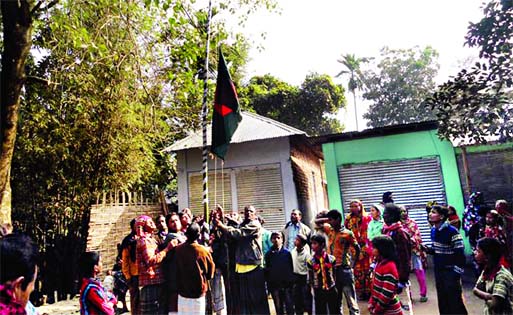
CM Kajawl :The long standing woes of the people of 162 enclaves are going to end as Rajya Sabha, the upper house of the Indian parliament, passed the constitution amendment bill on the much-talked about Land Boundary Agreement (LBA) between Bangladesh and India on Wednesday. The bill was placed before the Rajya Sabha to bring 19th amendment to the Indian Constitution with a view to ratifying the LBA, which was signed in 1974. External Affairs Minister Sushma Swaraj placed the bill before the Rajya Sabha. The bill has been passed with 181 members of Rajya Sabha giving their votes in unanimity.Now the bill will be placed before the lower house of the Indian parliament ‘Lok Sabha’ today (Thursday). Once the bill gets the nod from Lok Sabha, it would be sent to the President for final approval.State Minister for Foreign Affairs Shahriar Alam thanked India for the approval of Rajya Sabha. “The major hurdle for the implementation of LBA has been removed. Hopefully, the remaining process of the agreement will be completed very soon. The enclave dwellers will regain their rights with the implementation of the agreement,” he told journalists at his office.”The passage of the bill will remove constitutional barriers from the implementation of the long cherished LBA relating to the swap of 162 enclaves between the two neighboring countries.” The implementation of the agreement will also solve the disputes of adversely possessed areas and demarcation of un-demarcated borders between Bangladesh and four Indian states – West Bengal, Meghalaya, Assam and Tripura. After a series of discussions and analysis over the LBA, the Indian cabinet approved the constitution amendment bill on Tuesday with Indian Premier Narendra Modi presiding over the meeting.As per Indian Constitution, the bill has to be passed by a two-third majority in both house of the parliament.However, there was an initiative from the ruling BJP to exclude Assam from the purview of the agreement. But, with the opposition of Congress, BJP finally agreed to pass the full-fledged agreement.The LBA was signed for the demarcation of an area of approximately 6.1 km in the borders between Bangladesh and India, the exchange of 162 enclaves and over 5,000 acres of adversely possessed lands.Then President of Bangladesh Bangabandhu Sheikh Mujibur Rahman and the former Indian Prime Minister Indira Gandhi signed the agreement in 1974. Though Bangladesh ratified it in the parliament the same year, India could not ratify it. The two countries signed a protocol regarding the agreement during the former Indian Prime Minister Manmohan Singh’s visit to Bangladesh in 2011. Under this agreement Bangladesh will get possession of 111 enclaves located inside Bangladesh with 17,158 acres of land. The enclaves are spread across four districts in Bangladesh (12 in Kurigram, 59 in Lalmonirhat, four in Nilphamari and 36 in Panchagarh).Bangladeshi will transfer to India 51 enclaves, all located in Cooch Behar of West Bengal, with an area of 7,110 acres of land.The exchange of enclaves will solve the multifarious problems, including problem of national identity, of 51, 584 residents (37,369 people of India and 14,215 people of Bangladesh) of 162 enclaves either side of India and Bangladesh. In respect of adversely possessed land, India will get 2,777.038 acres and transfer 2,267.682 acres to Bangladesh.The residents of all enclaves will be given the option to choose their country after the implementation of LBA, Professor Imtiaz Ahmed, a teacher of International Relation at Dhaka University, said.Talking to The New Nation, he welcomed the Indian initiative regarding the parliamentary ratification of the agreement but he said it should have been done earlier.”The agreement was signed in 1974. We have ratified it in our parliament the same year. But, it is going to be implemented after 41 years. The two next door neighboring countries should have solved such problems much earlier,” he said.”Bangladesh and India have some other problems. If we take such a long time to implement an agreement, what will happen in the case of other disputes,” he said. However, the people of bordering areas of the both countries heaved a sigh of relief, saying it would remove various complications ahead of the enclave dwellers. The residents of four Indian enclaves inside Bangladesh under Dimla upazila of Nilphamari district celebrated the news of the passage of the bill in the Rajya Sabha in a festive mood. They distributed sweetmeats among the enclave residents. Jodunath Chandra Roy, an enclave resident in Dimpla upazila, expressed his unbounded happiness, saying that they were going to be released from the captivity of 68 years. “It will perhaps bring an end to the problem of our national identities,” he said. Moshiur Rahman, another enclave dweller, said “We have long been suffering from this problem. Now we want its immediate implementation,” he said.

